
The Reversal of Gender Gap in Learning: Why Boys Are Falling Behind in Upper Secondary Schools
Executive summaryThe global emphasis on addressing gender disparities in education has highlighted the importance of equitable academic achievement for policymakers, scholars, and the public. The Sustainable Development Goals (SDGs) have incorporated gender equity, emphasising the ongoing challenge of ensuring equal access to quality education worl...

Profitability and Technical Efficiency of Chilli Farms in Cambodia
In this study, we examine the revenue, costs, profits and technical efficiency of chilli farms in Cambodia. We employ a representative sample of 542 chilli farming households from Banteay Meanchey, Battambang, Kampong Chhnang, Kampong Cham, Tboung Khmum and Kandal. The sample was randomly selected using a two-stage stratified sampling design, where...
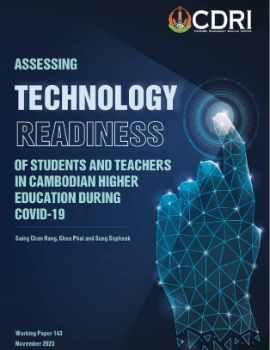
Assessing Technology Readiness of Students and Teachers in Cambodian Higher Education during COVID-19
The global COVID-19 pandemic brought unprecedented disruptions to the higher education landscape worldwide. Widespread school closures, driven by the imperative of social distancing to combat the virus's spread forced a rapid and dramatic shift from traditional face-to-face instruction to online learning and teaching environments in numerous countr...
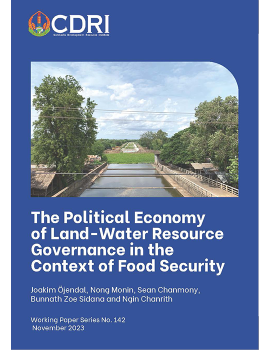
The Political Economy of Land-Water Resource Governance in the Context of Food Security in Cambodia
Water is central for a variety of livelihoods, development, economic growth, and food production. It is also very important in the large deltas of South and Southeast Asia. Yet, water is turning into a scare resource and global climate change is making its availability more unpredictable. Commercial interests and infrastructure development are also...
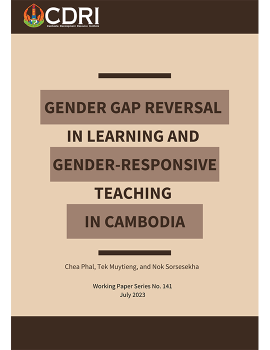
Gender Gap Reversal in Learning and Gender-Responsive Teaching in Cambodia
In the past two decades, Cambodia has been committed to the global agenda of ensuring that all children from all walks of life have access to education and quality learning opportunities. The focus was not only on access to education but also on gender parity and learning quality. Three years after the adoption of the Dakar Framework for Action in...
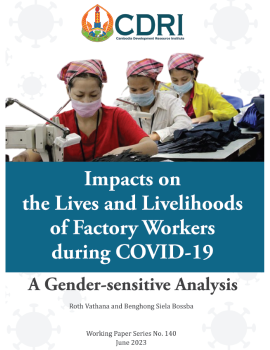
Impact on the Lives and Livelihoods of Factory Workers during COVID-19
This study analyses the impacts of COVID-19 on the lives and livelihoods of workers in the garment, textile and footwear manufacturing in Cambodia, a sector which employed approximately 800,000 people (80 percent of whom were female) and contributed about 70 percent to the country’s annual total export value prior to the pandemic. The analysis e...
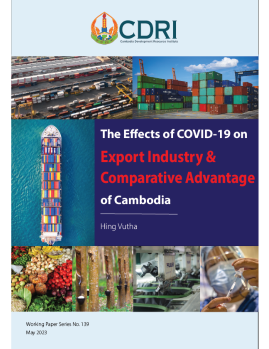
The Effects of COVID-19 on the Export Industry and Comparative Advantage of Cambodia
The repercussions of COVID-19 resulted in global disruptions to supply and demand as well as shocks to the global production networks. This paper employs a trade analysis approach to assess the impacts of coronavirus on Cambodia’s export performance. Utilising Revealed Comparative Advantage (RCA) index, changes were analysed using data pre-and post...
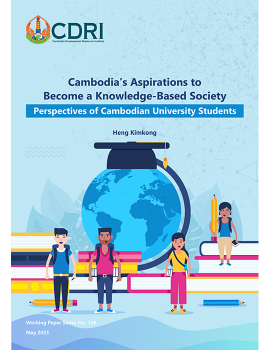
Cambodia’s Aspirations to Become a Knowledge-Based Society: Perspectives of Cambodian University Students
Background Cambodia envisages to become an upper-middle-income country by 2030 and a high-income country by 2050. The country also aspires to develop into a knowledge-based society (MoEYS 2014). To support these goals, it is crucial to consider the role of higher education institutions (HEIs), particularly universities, in training, research and...

Cambodian Upper Secondary School Education amid COVID-19 Pandemic: Challenges and Opportunities
The outbreak of Coronavirus Disease 2019 (COVID-19) was announced as a pandemic by the World Health Organization (WHO) on 11 March 2020. Its presence has created significant disturbances across society and particularly within education. On 16 March 2020, as a preventative measure against the spread of COVID-19, the Royal Government of Cambodia (RGC...
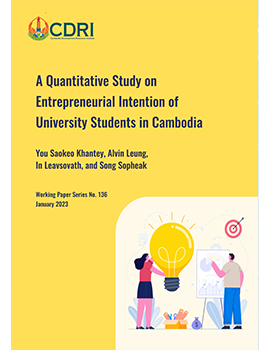
A Quantitative Study on Entrepreneurial Intention of University Students in Cambodia
Entrepreneurship is crucial to advancing the economy of Cambodia and fostering the development of society. The Royal Government of Cambodia has recognised the importance of entrepreneurship and included the promotion and entrepreneurship education in multiple policies and strategy. Universities and higher education institutes have been more active...
